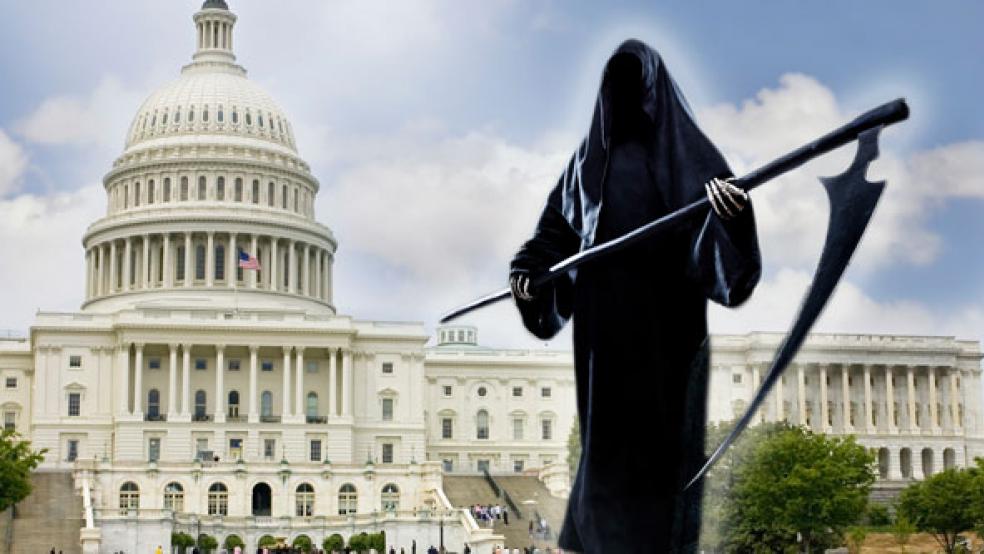This time there was no drama – no frenetic, last-minute drive by President Obama and congressional leaders to avert yet another fiscal crisis.
Our political class reacted to sequestration with rote speeches and several hours of inconsequential droning in the Senate Thursday afternoon about two competing partisan blueprints to avert $85 billion of random domestic and defense cuts set to take effect this weekend. Both measures failed, as their sponsors knew they would.
Previous battles over the debt ceiling and the fiscal cliff were filled with sound, fury, and fears about the painful thud of economic collapse. But the latest chapter in this saga—over whether to allow the first installment of automatic across- the- board spending cuts mandated by the Budget Control Act of 2011 to take effect—was mostly about posturing for the fights to come on the budget and the debt ceiling.
It is about winners and losers.
The Senate Republican alternative to the sequester – offered by Pat Toomey of Pennsylvania and James Inhofe of Oklahoma—would have left the budget cuts intact but provided new flexibility to decide where the cuts would fall.
In other words, Obama would become the axe man, a responsibility he did not want despite his concerns.
“The president has been campaigning across the country spreading this idea we will have a total meltdown if we have this austerity,” Toomey said. He added that his bill “would allow the president flexibility in how it’s achieved, so that we don’t have these very ham-handed, poorly designed, across the board cuts.”
Senate Democrats countered with a bill that embraced Obama’s call to replace the across-the-board budget cuts with a combination of other cuts and higher tax revenues. Despite the Democratic majority, it could not must the 60 votes needed to move through the chamber.
Even in stalemates, there are victors and victims. Here are the three biggest winners and the three biggest losers:
WINNERS
President Obama – The public is on Obama’s side, agreeing that the blame for the sequester rests with intransigent GOP lawmakers even though the idea for that measure originated from the White House. Obama has shrewdly traversed the airwaves, warning of its dire impact on the economy, insulating himself should—however remote the possibility—the cuts turn into an economic disaster.
“All the polls say President Obama is a winner and the congressional Republicans are losers,” said University of Virginia political scientist Larry Sabato. “Almost any president would be in this position; there is no way for the institution of Congress to compete with the White House bully pulpit.”
Tea Party-Style Republicans – The GOP might not be popular, but it managed to succeed in reducing the deficit. A group of roughly 60 conservative House Republicans view the survival of the sequester as a victory since their leadership did not retreat on deficit reduction that was once deemed calamitous.
“It is a real change from what we’ve seen before,” said one of the more conservative lawmakers Rep. Jim Jordan of Ohio. “And I think sometimes we’ve got to step back and say, hey, we’re making progress for taxpayers.”
Wall Street -- No panic by the market this time, unlike past fiscal crises. No heavy lobbying by groups such as the U.S. Chamber of Commerce and the Business Roundtable. There is little if anything in sequestration that can hurt the barons of Wall Street, and many analysts say the cuts constitute a miniscule percentage of GDP. The Dow Jones Industrial Average has surged 7.25 percent since the start of the year.
LOSERS
Public Trust –Since the Budget Control Act was first cobbled together in the summer of 2011 during the fight over the debt ceiling, congressional approval ratings have moved in a band of 11.3 percent to 19.8 percent and now stands at 15.4 percent, according to Real Clear Politics. When ratings last approached that nadir in 2010, Democrats lost their majority in the House. The Republicans retained their control in last November’s election, a sign that public will has not translated into a more responsive government.
Federal Workers – Collectively, the government’s 2 million-plus full-time employees and tens of thousands of contract workers will take the biggest hit under the sequester. Many will be furloughed and incur a 20 percent cut in their work weeks and pay. They are the punching bag, without much opportunity to swing back.
Aerospace and Shipbuilding – Two of the Pentagon’s sacred cows are getting slaughtered. Newport News, Va. already has lost a carrier overhaul contract, and may lose a second one. The crescent from Northern Virginia to Virginia Beach stands to lose a big chunk of its economy. Nationally, projected job losses in the defense industry range from one million to two million this year.





